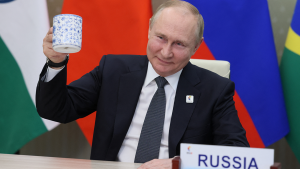BRICS Expansion Explained: New Members, New Challenges
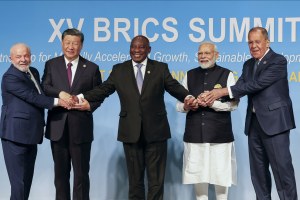 Play Podcast
Play Podcast
About the Episode
Deep Dish demystifies the world of BRICS+ and delves into the intriguing expansion that is making waves in international diplomacy. Discover its origins and the significance behind its newest members. Atlantic Council’s Colleen Cottle joins host Lizzy Shackelford to explore the motivations, the dynamics at play, and its potential impact on the world stage.
[Lizzy Shackelford: INTRO: This is Deep Dish on Global Affairs— going beyond the headlines on critical global issues. I’m your host, Lizzy Shackelford, with the Chicago Council on Global Affairs.
Today we're diving into a question that's been puzzling many: "What is BRICS exactly and what does its expansion really mean?" Well, folks, it’s more than an acronym, and it could be growing into a significant geopolitical grouping. Let's start with the basics... BRICS stands for Brazil, Russia, India, China, and South Africa. These five countries form a coalition that's looking to expand, and that expansion has been making waves on the global stage. But what do these countries intend to do? And are they seeking to create an alternate world order?
Here with me to unravel the mystery behind BRICS is Colleen Cottle, the deputy director of the Atlantic Council’s Global China Hub. She previously spent over a dozen years at the CIA covering East and South Asia. Colleen says that BRICS’ accounts for 40 percent of the world population...]
Colleen Cottle: And together those five countries have about 3.4 billion inhabitants. So, it's a pretty big block we're talking about. And then depending on which GDP measure you use, they account for as much as 31 percent of the global economy, if you take into account PPP power, so taking into account pricing differences, which is about the same share as the G7. So, it is a large economic block. A lot of that is owing to China. It's the largest by GDP geopolitical influence of the block. So, I think what makes the BRICS a particularly unique grouping, The first is that it's, very, uh, global in nature. So, many of the developing country groupings are more regional. So, you have the Shanghai cooperation organization, the SCO, which is mostly Eurasia based, and then you have various, ASEAN groupings, which is just purely Southeast Asia. And so, the BRICS contains, what each of them would see as the preeminent power in their respective regions with Africa represented, Latin America, Eurasia, and then different parts of Asia. And so together, they see themselves as key voices, representatives of their region and key voices for the emerging world. It's something that they, especially the India and China are kind of each claiming that leadership and together they're seeing this grouping as a way to do that. I think it's important to view this as a grouping and I try to avoid the term like block or coalition is even, you know, can be stronger than what they are because they have such divergent backgrounds and systems, although they do share a couple of commonalities.
Lizzy Shackelford: I know that kind of origin story of the original acronym came out of key emerging markets that were identified by a Goldman Sachs economist. And then they decided to turn that into an annual summit what ties these original countries together?
Colleen Cottle: It's easy to just focus on the differences in terms of ideology, political systems, even the structures of their economies and the way they approach the West. And if you focus just on the differences, it's easy to dismiss them and just say they can't agree on anything, given those big differences. But I think there are these commonalities that have helped them be a fairly durable grouping, I think that in addition to them each seeing themselves as respective regional leaders, they also share some common goals, with the first and foremost being this goal of establishing a multipolar world, an international system that better advances emerging market country and developing country interests. And first and foremost for them, this means greater representation in international fora like the World Bank and the IMF, where they have a greater voting share, for these decision making bodies and these institutions, as well as more leadership positions. That's something that they've often pushed together. And then secondarily, I think another thing that unites them is this desire to push back on the West's use of what they call unilateral sanctions and just this general idea of derisking and reducing their vulnerability to sanctions and just to global international market turbulence. A common goal is trying to reduce the role of the US dollar and their trade and investment flows. And that's something that's really come to the fore after the Western sanctions were levied on Russia, China and Russia have both increased trade in their own currencies. And Brazil has also been a pretty vocal proponent of this as well. And so, I think that this common vision has resonated with the Global South and has attracted these new members. There's 6, as you mentioned that joined, as many as 40 countries were apparently interested in joining according to South Africa, as many as 22 or 23 formally applied to join. So, I think that is a really important demand signal for what the grouping has to offer, whether it's this prestige angle or just a seat at the table with these major emerging, economies. In terms of what binds the new members. I think that's an interesting question. And I'm still kind of grappling with a little bit myself. What unites them? Because I think, there's a lot of things that are disparate about them. They make it a little bit harder to identify, you know, their one criteria that had been talked about for expansion was some level of economic dynamism as a way to infuse a little more vitality into the BRICS. Most of the BRICS countries, despite that, acronym is these up and comers back in the early 2000s are now facing pretty dim economic prospects with the exception of India and China. It's maybe a little bit more debatable.
Lizzy Shackelford: I am curious if we can kind of shift into looking into the move for expansion, you know, looking at the new countries that they've invited...
Colleen Cottle: So the idea if you bring a new members, you can infuse more economic growth into that group. But if you look at the new members that have joined, you have Argentina that's getting IMF bailouts and Ethiopia, that's war torn. That's clearly not a key criteria. I think other criteria, like having a stable political system clearly isn't at play or having strong linkages or role in the international economy, not in play with Iran. I think the 1 thing you could say is that these are each important players in their respective regions and that in particular, the Middle East and the North Africa region was an area that didn't have representation before, and you now have new BRICS members from that area, which for them, I think maybe helps around out that Global South narrative and discourse value a little bit. In addition, I think an interesting point to note about these new members is many of them have been signaled an interest in reducing the role of the dollar. In either their own trade or the broader system, you had Argentina using the Chinese currency to pay off its debt. Recently, Saudi Arabia and UAE are actively trying to explore using dollar alternatives. And I think you have this interest in a new way of, denominating trade with non local currencies. And you have a lot of these new, BRICS countries being energy exporters. And the older, the former BRICS countries are net energy importers. And so, I think this could offer kind of an interesting experiment to denominate inter BRICS energy trade in local currencies and use that to kind of build out one of BRICS country's goals reducing the role of dollar in trade. And I think we'll have to see how that actually pans out.
Lizzy Shackelford: That is a really interesting hypothesis, though, because, as you say, Saudi Arabia and UAE in particular, and I suppose Iran as well coming in offers something very concrete to the original BRICS members. How much of a threat do you think this should be taken towards, broad dollarization of the global economy? Even if they start doing more, kind of country to country trade in other currencies, is that a threat to a broad dollarization?
Colleen Cottle: I think from my perspective, it's hard to see the BRICS really doing more than chipping away at the dollars value in the near term and really becoming this coordinated, alternative to the European owned swift system, and in fact, some of the BRICS members themselves, you had South Africa, explicitly saying the BRICS weren't looking to replace swift. That being said, though, I think there are, efforts that they have underway that could. at a minimum, kind of increase the use of these other currencies and create more fragmentation in the global financial system, which does add to cost and reduce efficiencies and can create risks because it makes it harder to monitor. but in terms of what the BRICS themselves could do, I think, at the far end of the spectrum is this idea of a joint BRICS currency. It's unclear what that would even mean, whether they're talking about something as ambitious as the Euro, which would be pretty much infeasible, at least in the near term, because it would require a level of economic coordination and integration that these countries don't appear willing to take on. A more kind of near term measure would be something like a more integrated cross border payment system. The BRICS tried to stand up something called BRICS Pay in 2018, which appears to still kind of be in work. They seem to be still calibrating it. And in fact, test their finance ministers to over the course of the next year, come up with more, recommendations on how to enhance cross border payment. And then in the meantime, they are doing just a lot of bilateral trade. As I mentioned, China and Russia denominating their trade to their local currencies. The Chinese currency is probably the biggest, gaining currency from this, effort among the BRICS and writ large, the Chinese are really pursuing that as a financial goal. But I think in general, even though the increased bilateral transactions denominated in local currencies aren't going to, really shake the dollar's hold in the global economy.
Lizzy Shackelford: I've seen a lot of takes talking about how, China really seems to be shaping so much of who the countries were that were invited and the direction that BRICS is taking. How do you see that? how much is this is feeling kind of China driven?
Colleen Cottle: You know, the BRICS are a consensus based organization. So, in theory, any decision on new membership had been signed off on by all the countries. China has long been pushing for BRICS expansion. It pushed this as far back, as, last year when they were the chairman of the BRICS and then back in 2017, they were trying to float the idea of expanding the BRICS, and in part, I think they see expansion as a way to dilute the influence of some of the members that they have more diverging views, which would be the Indias and to a lesser extent, South Africa and Brazil. And I think probably over time, they've eroded that the resistance to it to some extent, although it sounds like there was even some last minute, intense negotiations about this current expansion, with India making some interventions. But I think at the end of the day, yes, China was able to maybe take advantage of South Africa wanting to have a prestigious announcement of expansion and so I think that, yes, you're right to say that China has a pretty big sway.
Lizzy Shackelford: Is this trading a sense of kind of, one primary player, the United States for a different primary player of China or is the BRICS expansion more of a move towards genuine multilateralism?
Colleen Cottle: I mean, some of the BRICS themselves are not trying to present as an alternative block to the G7. As I mentioned, South Africa had mentioned that about the swift currency of the Brazilian president also mentioned that. Um, and so even among BRICS, there's not a divergent view on exactly how strong of a stance to take, vis a vis the United States and its G7 and broader, group of partners and allies. but I think there is a view among BRICS countries that they want this, group to be at least, helping create a multi polar world where there is. This alternative voice in this alternative venue for emerging market country, interests and helping to kind of raise the attention and the focus as they probably rightly should do for G7. There is a desire for more concrete roles for these countries in global, system. And so, the BRICS offers chance to do that. I think some of the hype that you've brought Iran into the fold and now you've created this anti-US nexus potentially with China and Russia being the case. I think that is a little strong. At least right now. It seems like a premature concern to have because you do have India as a balancing voice in the grouping. You have South Africa and Brazil that all have interests in maintaining strong relationships with the US and with Europe, given their financial ties And so I think even some of those new members are going to have to be cognizant that, there's a lot of us relationships in the Middle East and what China is trying to put forward as a vision maintaining ties to the US and its allies and partners.
Lizzy Shackelford: I do think that puts some of these countries in a little bit of a sticky position. And I mean, particularly as you've noted, inviting Iran into the fold. And you know, BRICS does seem like a space or a tool that really is well designed to help do an end run around Western sanctions, on both Russia and Iran. How do you think the West should be taking this expansion, particularly the inclusion of Iran and the fact that it will dilute the power of some of those Western tools.
Colleen Cottle: I'm curious to see how much they can actually establish mechanisms that help in terms of sanction evasion by some of the stuff they probably would have been doing a bilaterally around the margins anyways, but I do think in general that the US and its partners should be watching the demand signals coming out of the emerging world, for a stronger voice. It's an oversubscribed expansion, right? A lot more developing countries leaders wanted to join than they were offered slots. And so, I think that the imperative is really on the US and its partners and allies to really step up their game and offer a value proposition for the global South when it comes to incorporating them more fulsomely into international organizations and giving them a voice in the system, as well as just giving them a better value proposition when it comes to development. And by that, I mean, some of the initiatives that the G7. Have tried to put forward as a alternative vision to things like the Belt and Road initiative that China has major foreign economic policy initiative in splashing investment around the parts of the global South. But these G7 initiatives, I think the US needs to come with a much more coherent strategy for them. Much stronger communication strategy where they're laying out their long term vision for their engagement with the region and then coupling that with very concrete, tangible investments that come quickly that they're responsive to those developing country needs in a way that a lot of the times the Chinese companies are much, much faster to come in and much easier to work with. And so that becomes the de facto choice on the ground. And so, I think there's a need to step up that game and really provide that alternative, in a way that's most useful for those countries.
Lizzy Shackelford: I think it would be a mistake not to see this as looking to fill in gaps that the existing global order just isn't delivering. I mean, Egypt and Argentina are both, countries that are not getting the assistance that I think they'd like out of the IMF and others right now. I'd love to hear your take on the frenemies involved, the original grouping- India and China, decidedly a difficult relationship. And, if all the invited countries, do join, you've got Saudi Arabia and Iran, Egypt and Ethiopia. These are just really interesting pairings to be within the same block. What do you think are the upsides and downsides of having those types of kind of tricky relationships inside the same grouping?
Colleen Cottle: That certainly makes for good dinner conversations, I guess. Um, but I do think that the China India dynamic seems to have been growing. The tension seems to be growing, particularly over the past couple years as the border tensions have actually spilled over into action. And then most recently, you had the Chinese publishing the map that had parts of India and other neighbors, drawn into its Chinese territory. But I think the 2 countries have heavily had to balance that competition the one hand with their joint desire to show that the BRICS as a meaningful grouping of countries that belongs on the world stage and can actually accomplish things. So, they have been able to put aside some differing visions to do things, such as creating the new development bank. But they're also cooperating on any number of working level working groups on different ranges of issues. And there is a still a pretty strong and vibrant economic relationship, that the two have as well. So, I think in some cases, it's a situation of compartmentalizing friction. And some of it spills over into the forum, and I think some of it, can be left on the sidelines. I don't know as much about the Saudi and Iran dynamic, but that is certainly interesting to have brought into the group and I can't help wondering if Beijing seems this as a way to continue playing that peacemaker role and showing that BRICS led by China can successfully incorporate these two regional rivals into the system and show the world how this is done, how to reduce conflict and use common interest to advance those common goals. So, I think we'll have to see how it all plays out. But there can be a fair amount of compartmentalizing, in these types of organizations, or you end up with incredibly watered down joint statements in some instances that could be there as well.
Lizzy Shackelford: Would you see the position where kind of BRICS+ is now, is something likely to drive them to a more tangible organizational structure in order to help navigate how you get all of these disparate players on board or do you think it's more likely to kind of, as you say, at risk, just watering it down to, having less room to agree to things?
Colleen Cottle: I mean, there's long been talk about should the BRICS have a permanent secretariat they use the same model as the G20, where they have a rotating, secretariat and rotating presidency and whoever is the president, drives the agenda of the organization. I think the question might be when they turn over the rotating presidency to these new members, and I'm curious as to whether that will happen soon, or they will rotate all the way through the current BRICS members, and then at that point, see how the new members have engaged in the group and the value they've brought and maybe then make the call. Do we establish a permanent secretariat? So, we don't turn it over to them, or do we give them that opportunity? I think can't ignore that has to be decreases in efficiency with that many more members. There's just more people, more voices at the table, more people to schedule meetings around and more divergent interests when it comes to, just putting numbers on paper estimates on things. But I do think could potentially, if you have these new members joining things like the BRICS new development bank and money coming out of the Middle East, it could add significant resources to be lending and conducting projects and that gives them a great narrative for the rest of the world to show they are actually making a difference in these countries that have joined.
Lizzy Shackelford: Looking at the perspective of countries and organizations on the outside of BRICS+, are there upsides for the broader global system that you see to having a more influential BRICS or just kind of a stronger voice for the global South in geopolitics?
Colleen Cottle: I guess it comes down to whose perspective you're taking. I think for the global South, there's certainly an upside to having a larger voice that represents more of the Global South and more, regions and, shows the vibrancy and the heterogeneous nature of the Global South. I think that certainly would have to be a benefit for some of those countries. I think if the BRICS does turn into that the threatened anti-West nexus, then I think that could potentially be damaging. I do have a hard time seeing an upside for the US and the G7 of a stronger BRICS except for the fact that I think, as I mentioned, it could cause them to need to up their game. And it really helped them refine and tailor their message kind of a forcing mechanism, to do so. Although I'm not quite clear that's, the case. You had, the national security advisor, Jake Sullivan, immediately after the summit saying, we don't see the BRICS as a threat to G7 and the current world order. There's so many differences among them. So, it is easy to dismiss the group and not take it as a chance to recalibrate your message. But we'll be seeing as. G20 messaging comes out if there's been any new impetus for that type of new message.
Lizzy Shackelford: If you were looking from inside the US or a European administration, what do you think the best way to react to this move would be? And what lessons should the US and other Western partners take from just how popular BRICS seems to be among the global South today?
Colleen Cottle: The key lesson is we need to up our game. And I think there is a lot a working level and there's a lot of meetings and there's a very lengthy press release on what I mentioned the PGII - The partnership for global and infrastructure investment. But I think actually getting out there and having meetings on the ground with these officials, putting your embassies to work, really saying here's our value preposition. How can we make this work for you?
Lizzy Shackelford: Colleen Cottle of the Atlantic Council -- I want to thank you so much for being on Deep Dish and giving us a comprehensive look at BRICS and what BRICS+ means in the ever-evolving geopolitical landscape. Thanks for being here!
Colleen Cottle: Thank you so much for having me.
[Lizzy Shackelford: OUTRO: And thank you for tuning in to this episode of Deep Dish!
A reminder that we want to hear more from you, our listeners. So, send us an email or, better yet, a voice memo, to deepdish@globalaffairs.org You can suggest issues you’d like us to cover, guests you’d love to hear from, or you can just let us know how you think we’re doing.
And if you are looking for more Deep Dish in your podcast diet? Tap the “follow” button in your podcast app so you get each new episode as it’s released. If you think you know someone who would like today's episode, please "share" it with them!
As a reminder, the opinions you heard belong to the people who expressed them and not the Chicago Council on Global Affairs. This episode is produced and edited by Kyra Dahring and mixed by Frank McKearn from Aphorism Productions.
Thank you for listening. I’m Lizzy Shackelford and we’ll be back next week with another slice of Deep Dish.]




Related Content
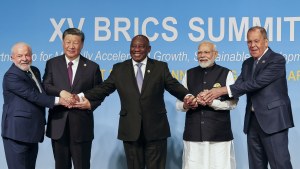 Global Politics
Global Politics
The bloc's popularity signals dissatisfaction with the Western-run global order, Elizabeth Shackelford writes.
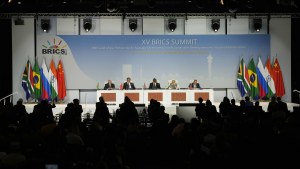 Global Politics
Global Politics
Even if BRICS has not yet accomplished anything concrete, the message of dissatisfaction its expansion sends to the West is deafening, Paul Poast writes.
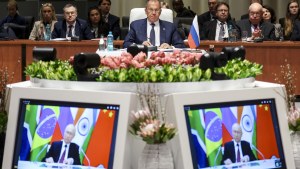 Global Politics
Global Politics
Steven Erlanger, Bobby Ghosh, and Nahal Toosi join Ivo Daalder to discuss the week's top news stories.
